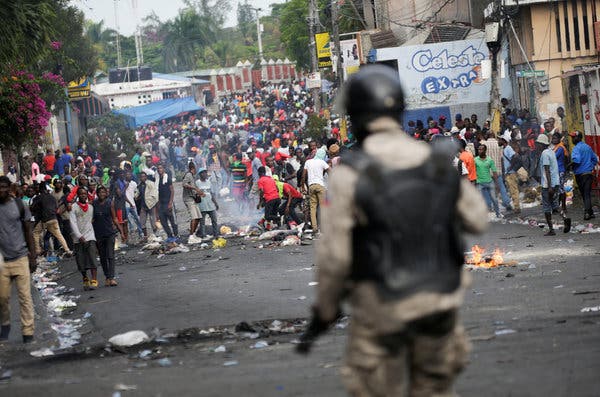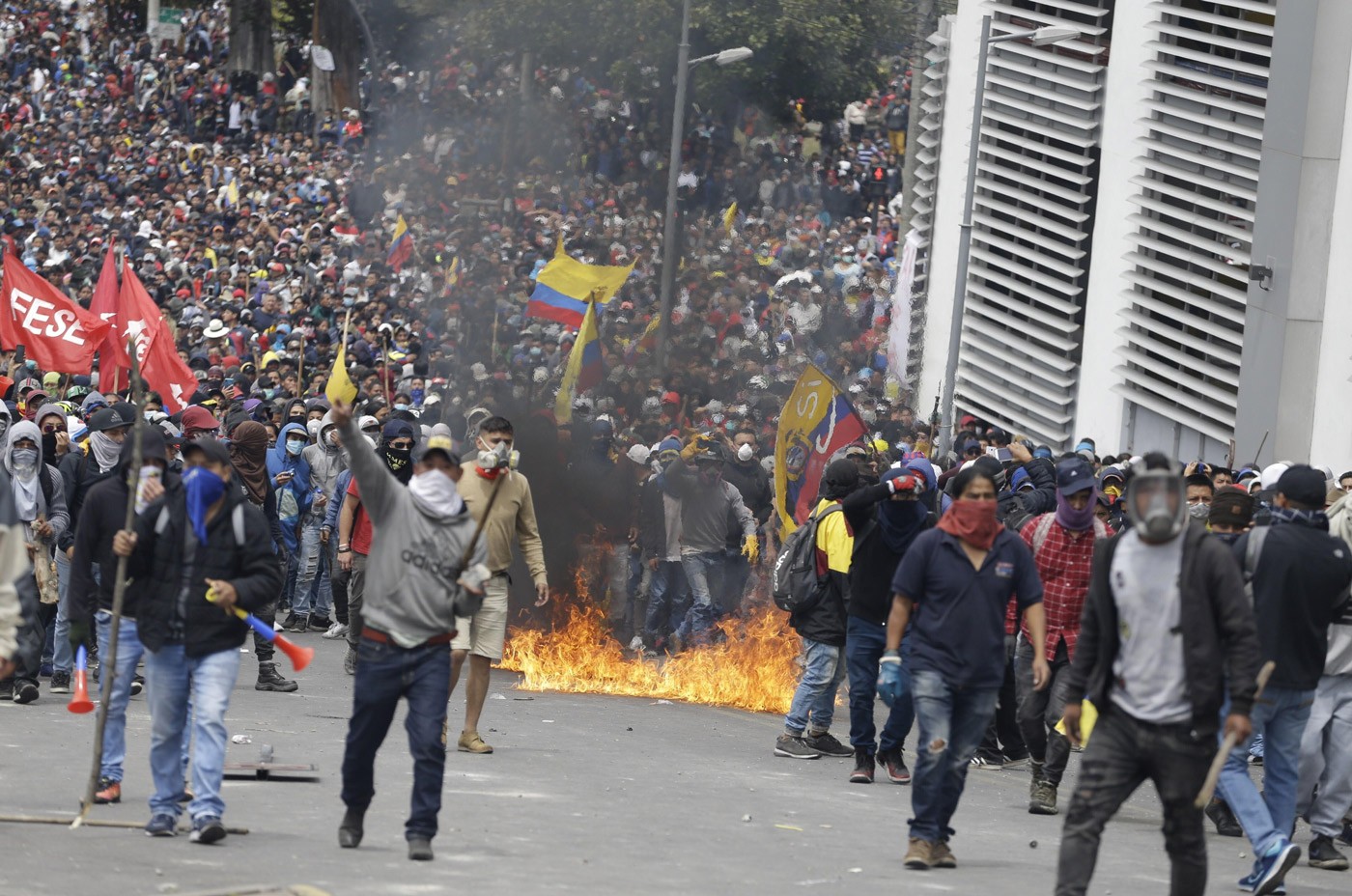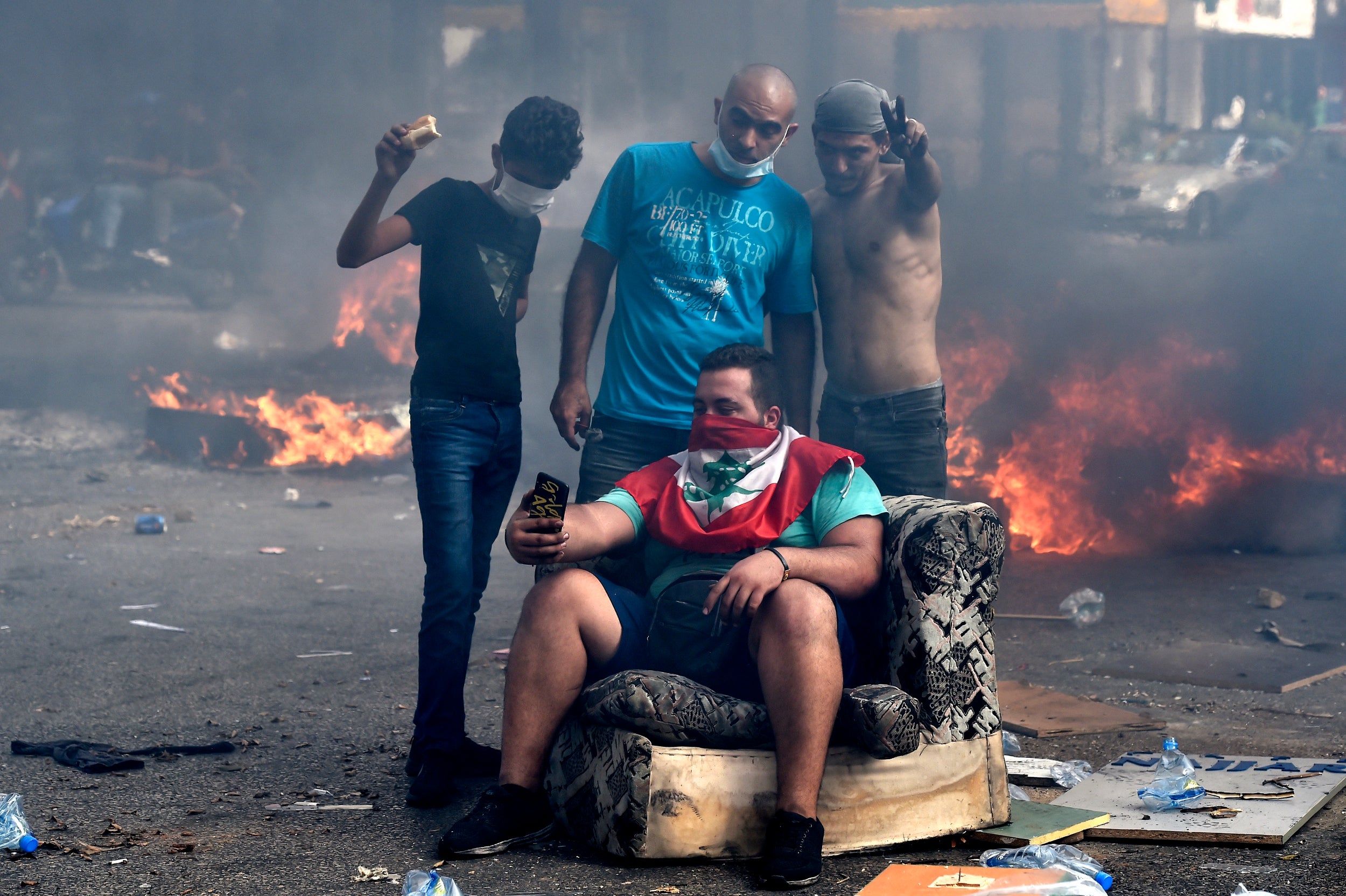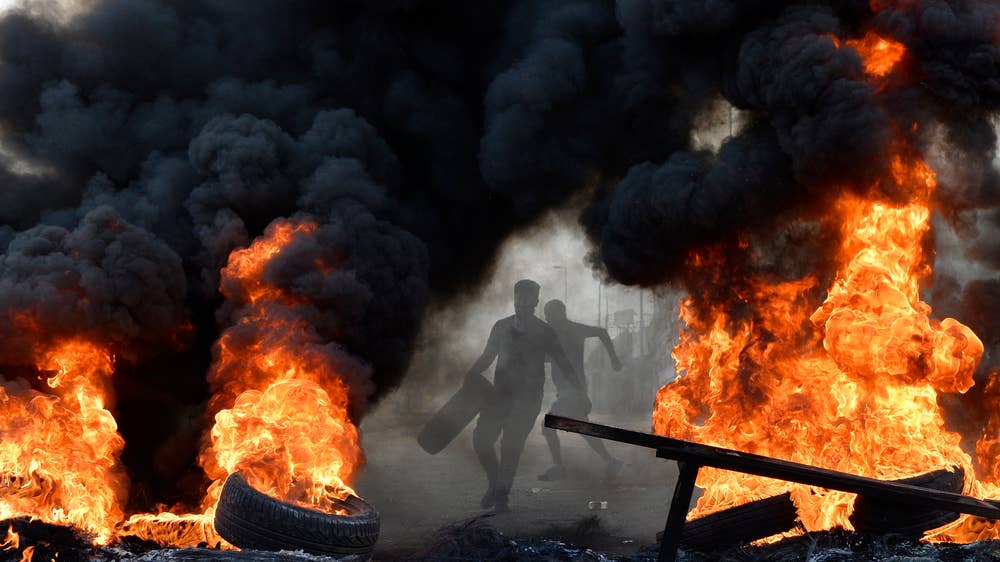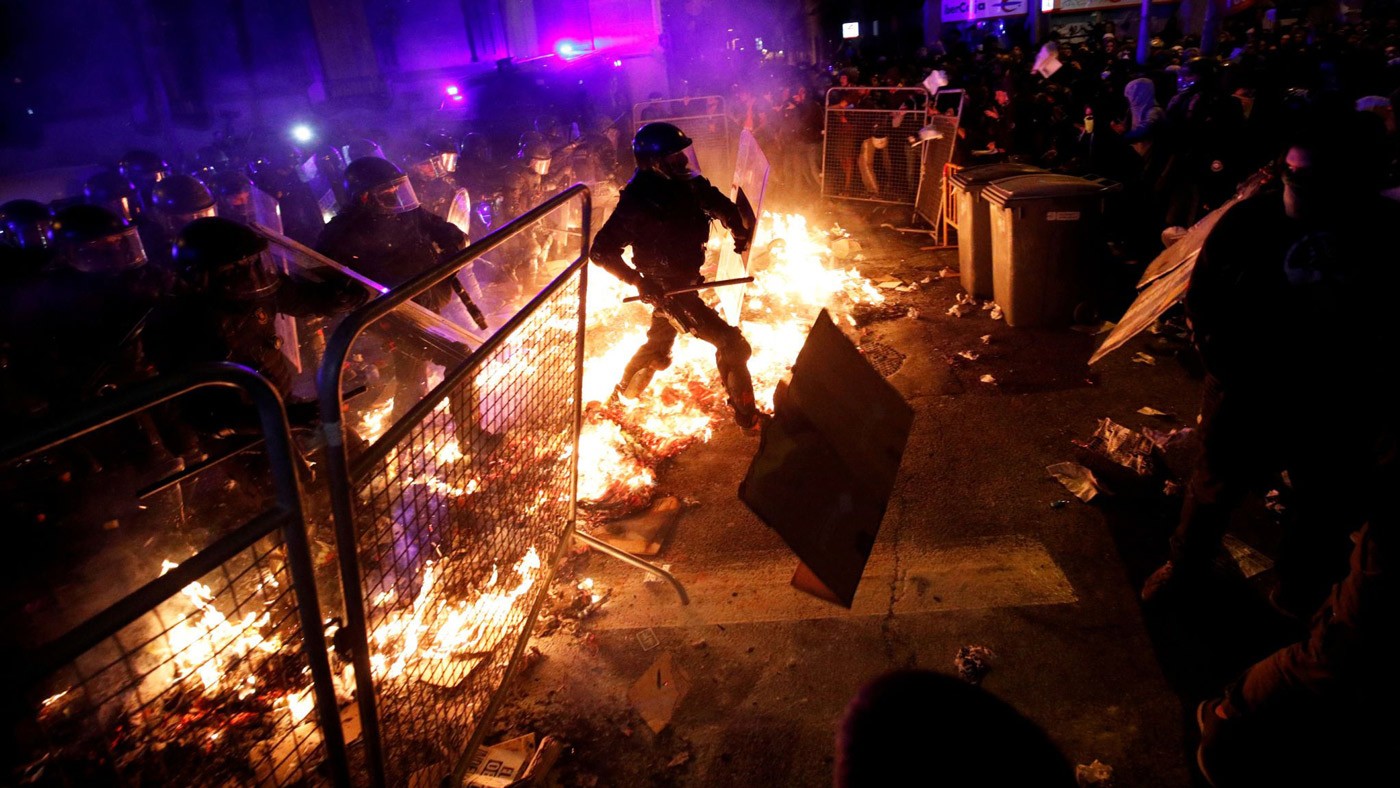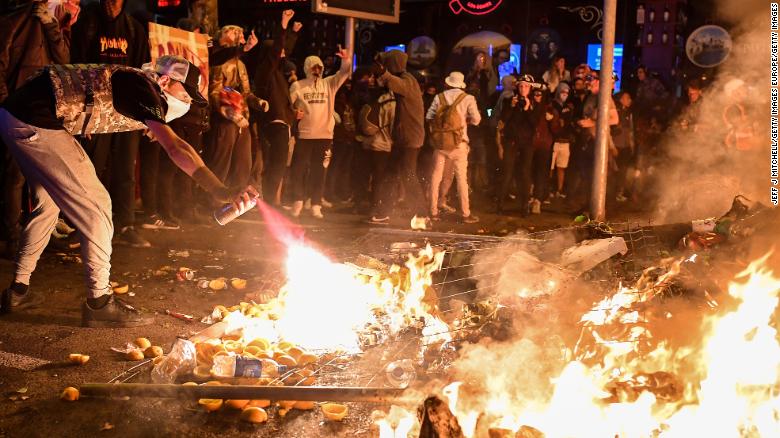Filed under: Analysis, Featured, International Coverage
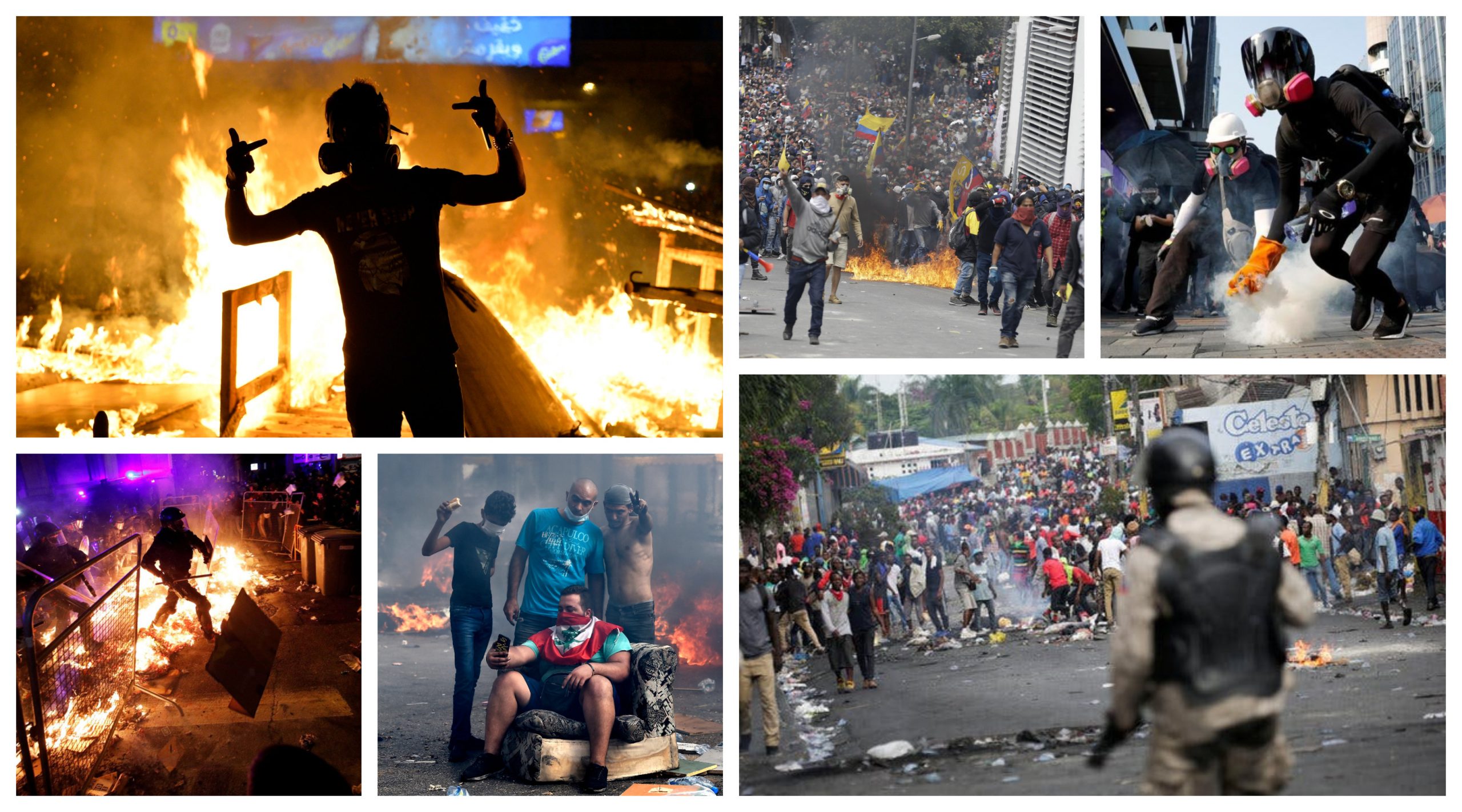
We are witnessing a new round of insurrections kick off across the globe.
While each of the revolts that we will briefly go over below are very different, there are certain aspects that unite them. First and foremost, many of these insurrections are the direct result of people violently rejecting austerity and by extension, decades of neoliberal reforms and structural adjustment programs (themselves simply extensions of past colonial systems) which have also led to economic precarity and crippling poverty. In Haiti and Ecuador, the most recent round of riots and uprisings was kicked off by increased gas prices; in the Sudan, it was the price of goods tripling, in Lebanon, it was over new taxes; in Honduras against austerity cuts to the public sector; and in Chile, it was against the launch of a fare increase. In short, as in the United States, across the world since the collapse of financial markets in 2008, the capitalist class has rebuilt its wealth through a regime of austerity, increased costs, and the suppression of wages. Currently, we are seeing the limits of the proletariat’s patience with such a model.
Second, another common factor of many of these revolts is the widespread anger over government corruption, especially in the face of increasing poverty. In Haiti this is the most clear, where massive amounts of aid that was supposed to go towards 2010 earthquake victims has instead been laundered and government nepotism is widespread, while in Honduras, people have been launching riots against Juan Orlando Hernández, who was installed by a US backed coup and is alleged to have taken money from drug cartels for his political campaign.
Third, this new round of revolts often targets infrastructure and the circulation of commodities, including human labor itself. Thus we see massive demonstrations in Haiti which march on wealthy neighborhoods and shut down the entirety of society. In Chile, people have moved from evading fares to burning down a major energy company building and entire subway cars, while in Hong Kong, people have begun to set fire to banks.
the government increased train fares in chile, so people simply set fire to the trains. i love this. pic.twitter.com/xxppKnb9nY
— Nick Schadegg (@nickschadegg) October 21, 2019
In most of these revolts, generalized rioting is seen as the standard avenue of struggle and has also been the vehicle in which these contestations have generalized; not isolated themselves from society. This stands in stark contrast to the argument that we hear again and again from academics and protest managers in the United States: that looting, property destruction, and rioting alienate the majority of the population, especially so-called “middle class liberals,” and doom social movements to failure. Despite all the evidence to the contrary in US history, if one needs a current rebuke of such an argument, simply look at what is happening across the world.
Lastly, the current insurrections also showcase the State entering into a state of exception, through either enforcing when and where people can be, granting military or police special powers, passing new laws that made previous everyday actions now illegal, or simply giving the authorities the green light to open fire. In the Sudan, a three month state of emergency opened a window for the State to murder and disappear protest and opposition leaders. In Ecuador, curfews were enforced. In Chile, laws not used since the Pinochet dictatorship have been utilized to allow the military free reign on the streets to put down the revolt. In Hong Kong, the State attempted to ban masks and demonstrations, while in Spain, the government attempted to imprison Catalan leaders who had pushed for independence. Meanwhile in Rojava, a so-called ceasefire agreement between the US and Turkey has given cover for continued attacks by Turkish and Jihadi forces against the autonomous region.
“If there’s no bread for the poor, there’s no peace for the rich.” #chile pic.twitter.com/o2m5FzGPsi
— Patty Abalos ✊?? (@mspattyabalos) October 19, 2019
It’s worth pointing out that all of these current realities are playing themselves out within the United States as well. Since the 1970s we’ve seen both the build up of a repressive campaign of counter-insurgency aimed against black, brown, and poor communities, while wages have been suppressed and globalization and automation have worked to gut the former gains made by labor in the post-WWII period. Meanwhile, the cost of living, fuel, education, everyday commodities, health care, and especially housing has risen astronomically, resulting in the mass stratification of wealth along racial and class lines. This context has been compounded by a massive redistribution of wealth through the recent Trump tax cuts amid widespread corruption and cronyism within the administration and the wider political class, as attacks against immigrants, social movements, and the poor have increased behind a backdrop of Trump’s calls for “civil war.”
With all that in mind, here’s a list of some of the places where it’s currently going down.
Haiti
For weeks, Haitians have taken to the streets in order to demand the fall of the US backed president, Jovenel Moise, against widespread corruption, and rising fuel costs. Tens of thousands of people have hit the streets in an insurrectionary street movement that has paralyzed the country, shuttered schools, targeted wealthy neighborhoods with mass demonstrations, and clashed with authorities, who often open fire on street protests.
According to the Washington Post:
Near-daily protests in Port-au-Prince, other cities and the countryside have shut down transportation links, shuttered businesses and closed schools, paralyzing the Caribbean nation of 11 million. At least 18 people have died in clashes with police and other violence.
Haitians have long been fed up with poverty, scarcity and corruption. The country is perennially the poorest in the Western Hemisphere; more than half the population lives on less than $2.40 a month.
A deepening fuel shortage in mid-September, on top of spiraling inflation, a lack of safe drinking water, environmental degradation and food scarcity caused Haitians to block roads and highways, set fires, attack property and loot businesses. The riots led to massive marches against the government.
But it’s not just the economic crisis. In large part, it’s the sense of crippling corruption at the highest levels that has gone unpunished.
People are also enraged that the island has received millions of dollars in aid since an earthquake in 2010, but public services and infrastructure remain just as precarious.
“There’s not just a political fight going on today, but the manifestation of a systemic crisis,” said Jake Johnston, an international research associate covering Haiti for the Center for Economic and Policy Research. “Haiti is facing a broad rejection of a political and economic system that in 30 years has failed to deliver results for the majority of the population. There’s a general distrust of politicians and elections. And the promises of economic development after the earthquake have clearly not been met.
Currently, outside of sporadic reports in mainstream corporate press, the best way to stay up to date on the revolt is to follow the Haiti Information Project on Twitter. They report daily on the revolt, often with videos and photos.
Protesters in #Haiti's capital attempt march up Delmas towards wealthy enclave in Petionville. pic.twitter.com/4p8vOCiEOB
— Haiti Information Project ? (@HaitiInfoProj) October 20, 2019
Sudan
The country in northeast Africa saw massive demonstrations today as:
Thousands…took to the streets across Sudan…to call for disbanding former President Omar al-Bashir’s party, the political organ he used to control the country during his 30 years of autocratic rule before being ousted in April.
Last December, the country saw enormous protests break out following the tripling the cost of goods during a period of massive economic instability. A variety of groups pushed for President al-Bashir, who had been in power for over 30 years to step down, which led to intense State repression and the murder of protesters and opposition leaders. Despite this, in April of 2019, the government was overthrown, al-Bashir was arrested, and a three month state of emergency was put into place, resulting in more clashes and deaths between protesters and State forces. By late summer, an alliance of protest groups and the ruling military government had signed a new constitution, however, unrest has remained ongoing.
According to the Washington Post:
Sudan’s current transitional government came to power after a similar campaign of mass unrest, which eventually led the military to overthrow al-Bashir. The country is now ruled by a joint military-civilian administration, which must navigate a delicate path toward eventual democratic elections in just over three years.
There were no reports of any clashes with police or casualties during Monday’s protests. The marches renewed demands for independent investigation into the deadly break-up of a protest camp by security forces in June.
A statement by the police warned against “creating a state of chaos,” which it said could lead to “unfavorable consequences.”
Outside of the mainstream press, Salish Sea Black Autonomists has been tweeting regularly about the #SudanUprising.
21 Oct 2019 Millioniya
"We're not going back an inch." https://t.co/0FFbiszHzr
— ChristineKaratnytsky (@ckaratnytsky) October 21, 2019
Ecuador
In response to harsh austerity measures that were enacted in the hopes of securing an IMF loan, a mass insurrection broke out across the country, with indigenous movements playing a major role. In mid-October, the President announced that they were killing the austerity bill and wold instead work with indigenous groups involved in the protests, however others have pushed forward.
As CrimethInc. wrote:
[President] Moreno is the successor to and former vice president of the leftist Rafael Correa, who rode to power on the momentum of the social movements of the 1990s and ruled the country from 2007 on, implementing the same neoliberal model for pacifying and co-opting social movements applied by other left governments in Latin America like the Workers Party (PT) in Brazil.
As Abolition Media Worldwide reported:
For the first time in the history of the Republic of Ecuador, the government headquarters was transferred from Quito, the capital city, to Guayaquil on October 7 due to a popular insurrection against Moreno’s decision to launch harsh austerity measures to secure an International Monetary Fund (IMF) loan.
Ecuadorian President Lenin Moreno has imposed a curfew on the capital, Quito, as 10 days of protests continue to rock the city, paralysing the centre and forcing the government to flee.
More and more cities are joining in the national strike and media has been severely restricted. “No place to hide” is the cry that people have adopted in tacit allusion to the change of government headquarters.
Since the demonstrations began 10 days ago, 5 people have been killed, hundreds wounded, and over 1,000 people have been detained nationwide
What started as a protest about austerity has become a total insurrection against the government and capitalism.
From an interview conducted by CrimethInc.:
The resistance that is happening at this moment, which is already eight days old, is already an historic event. It is the biggest uprising in recent years—historically, I don’t know, but it is certainly the biggest strike in recent years, which has as its protagonist the indigenous people, because the uprisings of the past did not last as long as they are now.
Austerity and the policy of subsidy reductions affect daily life in Ecuador, but I believe there is a class divide in what is happening these days in Quito and throughout the country. Part of the population does not understand the reasons for the protest; they say that in fact the government is not raising the price of gasoline but merely removing an existing subsidy. What they do not understand is that increasing gasoline increases the price of tickets, for example. A 10 cent increase is a lot for a public university student. Food prices have also increased during this period. For small vendors who buy things for their everyday use and earn very little, it affects them a lot. For example, a sack of potatoes that was $18 ten days ago is now $30 to $35 dollars.
There has been an immediate spike in gasoline prices. The annual subsidies allowed for greater access to food staples and other types of consumer goods; most of the food—for example, vegetables grown in the Sierra [the Andes] or bananas grown on the Costa plantations—is transported in diesel trucks. Most city buses, too. There is a connection between gas subsides and the prices of basic grocery products. If gas costs rise, all prices will rise—food, transport, power.
As I said, there is a class issue: the middle class may not be suffering as a consequence of these measures, but most of the population is already feeling them. Indigenous people know that they will not be able to sell their products—and that when they have to sell them to townspeople, they will earn very little. In the end, this is a chain in which the direct producer is the one who earns the least, and they know it. It’s necessary to understand that here, the food in the big cities arrives from the countryside, so there is a direct effect of the rising price of gasoline on the small producers in the countryside, where most of the indigenous people live.
There’s been several texts written on the subject of the revolt in Ecuador, one an interview from someone on the ground from CrimethInc. and another from Abolition Media Worldwide.
Chile
Kicking off with resistance to a metro fare increase, a massive insurrectionary wave has led to the government calling in the military and declaring martial law, while fierce clashes have continued in the streets. Currently, the Chilean State has reported that only 8 people have been murdered by government forces, while opposition groups have stated the real number is much higher. A general strike has been called for today and the situation continues to evolve.
As one report wrote:
It’s been a week since the Santiago Metro fare reached the astronomical price of $830 [Chilean pesos] and the uncontrollable student youth proletarians – which bears the virtue of negating this world through practice, avoiding any type of dialogue with power – launched an offensive calling on a “massive [fare] evasion” which self-organized a massive disobedience movement, that had from its inception the sympathy of many in our class, since this mode of collective transportation is used by at least 3 million people everyday.
The State responded by deploying hundreds of special forces police to protect stations which provoked clashes within the system of subterranean trains, leaving hundreds injured and arrested. On Oct. 18th there was a rupture: in the middle of a new day of protest against the fare hikes, there began a total shutdown around 3PM, one by one, of the Metro Santiago lines which provoked a collapse hitherto unseen in the metropolitan urban transport. On that day the spark began and the proletarian class demonstrated its power, when thousands of people took the streets, overwhelming the repressive forces and participated in large riots in the city-center that exceeded any expectations. The ENEL corporate building (an electrical company that operates in Chile) burned in flames and various Metro stations met the same fate. Capital & the State showed their true face to the population, declaring a “State of Emergency,” which brought out the military to the streets, for the first time since the end of the Dictatorship as part of the social conflict.
In an interview with CrimethInc., one Chilean anarchist stated:
The emergency powers that the Chilean state has implemented were passed down from the Pinochet (or Pinoshit, as we like to call him here) dictatorship. The Domestic Security Law (Ley de Seguridad Interior del Estado, or LSE) has existed since 1958, before the military’s 1973 coup, but in 1975, the dictatorship greatly expanded its powers, especially regarding crimes of “public disorder.” The law raises the penalties and sentencing for a variety of violations and crimes during times when the “functioning of the country” is altered. For example, in 2002, the government (headed by socialists!) used the LSE against a bus drivers’ strike. In general, it serves more as a deterrent and a threat than an actual tool for taking anyone in particular to trial.
Then there’s the State of Emergency currently in effect, which was written into the dictatorship’s 1980 constitution, the same constitution we have today.
An uprising is happening in Santiago, Chile because people are fed up with the inequality.
They set fire to the Enel Chile power company building. pic.twitter.com/pv8S6GmTFp
— Benjamin Young Savage (ᐱᓐᒋᐱᓐ) (@benjancewicz) October 19, 2019
There’s been several interviews, articles, and translations from CrimethInc., Abolition Media Worldwide and Ediciones Inéditas on the situation in Chile which offer a lot of insight:
- Chile: Resisting Under Martial Law
- Week of Public Transport Sabotage Sparks Social Insurrection in Chile
- Evade and Struggle: Riots Break Out Against Austerity in Chile
- The Revolt Generalizes
BREAKING VIDEO: Riots continue in Chile despite curfew pic.twitter.com/CJ90yrgX2Z
— News Breaking LIVE (@NewsBreaking) October 20, 2019
Honduras
Riots have broken out across Honduras against the right-wing regime of Juan Orlando Hernández, which was installed through a coup backed by the United States during Obama’s presidency; a coup which Hillary Clinton played a major role in. For months, demonstrators have called for the removal of the president, claiming that he took money from drug cartels to use towards his presidential campaign and also plans to carry out extreme austerity measures.
As The Guardian wrote:
The premises of at least three businesses in the city were set on fire after protests turned violent, officials said, and riot police clashed with demonstrators while attempting to disperse the crowd with teargas and water cannons.
“The narco must go, JOH must go!” protesters chanted, using the president’s initials, as they marched through central Tegucigalpa towards congress.
A court filing was published late last week in which US prosecutors alleged that Hernández’s 2013 presidential campaign had been partly funded by money from drug traffickers.
The document filed to the US southern district court of New York said the Hernández campaign received $1.5m from “drug proceeds” that were used to bribe local officials in exchange for protection and the completion of public works.
Protesters attacked police with sticks and stones near congress after officers deployed teargas, and a Red Cross official said five people were treated for injuries.
Several days ago, the younger brother of Juan Orlando Hernández was found guilty of drug trafficking charges in the United States, kicking off a new round of riots as Abolition Media Worldwide reported:
Thousands of people participated in almost all of Honduras in looting, rioting and intense popular night demonstrations that extended until Saturday morning to demand the removal of President Juan Orlando Hernández.
Fierce protesters blocked numerous points on the main roads of the national territory with stones and tires and prevented the passage of vehicles in nine of the 18 Honduran provinces.
A police transport truck was set on fire in the busy Suyapa Boulevard in Tegucigalpa. The driver fled the place shortly after moving about 20 agents.
A gas station in the San Miguel neighborhood, east of Tegucigalpa, and another in Kennedy, to the south, were assaulted by people who also damaged road and commercial signs in different parts of the capital.
The far right wing Hernández regime was installed in a coup, supported by the Obama administration and, in particular, Hillary Clinton. The uprising in Honduras comes as revolts have hit many parts of the world, including Haiti, Chile, and Lebanon. Revolutionaries in the streets are fighting against capitalism and imperialism, and will settle for nothing but the complete destruction of the system of neoliberalism that causes so much misery around the world.
For more info on the revolt, check out:
Rojava
Fighting continues in Rojava despite a ceasefire agreement being reached by Vice President Mike Pence and Erdogan, while the Syrian Democratic Forces (SDF) reporting that Turkey has violated the ceasefire agreement 37 times.
As CrimethInc. wrote of the ceasefire:
The supposed ceasefire announced by US Vice President Mike Pence is a deadly fraud. Its only purpose is to enable the Trump administration to wash its hands of the bloodshed that the Turkish military is perpetrating while shifting the discourse to blame the victims for continuing to resist. If anything, this fake ceasefire is a greater betrayal than Donald Trump’s original decision to give Turkish President Recep Tayyip Erdoğan the green light to invade Rojava and carry out ethnic cleansing against the Kurdish people there in the same way he has in Turkey.
By declaring surrender unilaterally on behalf of the people who have been defending themselves against Turkey’s invasion, Trump and Erdoğan are trying to force them to give up the territory that Turkey hasn’t yet been able to occupy by force. The Islamic State (ISIS) and the other jihadi groups that have taken advantage of the Turkish invasion to resume activity won’t respect the ceasefire in any case. The US has pulled its forces out of the area and has no intention of monitoring Turkish aggression, let alone discouraging it. The fact that Trump has used the supposed ceasefire as an excuse to suspend the economic sanctions that other members of the US government demanded he impose on Turkey confirms this clearly enough.
In fact, Turkey has explicitly denied that this represents a truce and the Turkish military and its Syrian mercenary proxies are already violating the ceasefire with impunity. In addition to reports that have reached us direct from the YPJ (Women’s Protection Units), various corporate media sources have reported that the ceasefire has not stopped Turkish forces from continuing to fire on parts of Syria held by the Syrian Democratic Forces (SDF). The SDF commander in Serêkaniyê reported Friday that more than 40 of their positions had been attacked since the declaration of the so-called ceasefire.
All this tragedy only confirms that no government—neither the US nor Russia, neither Syria nor Turkey nor any state government that might have come to power had the Syrian revolution been successful—can be trusted to look out for the human beings who always suffer most as a consequence of politics and militarism. Autonomous social movements grounded in principles of self-determination and solidarity are the only reliable way to oppose military aggression and support struggles for liberation worldwide. We need to make our movements powerful enough to be able to leverage a real threat to governments and corporations that are complicit in invasions like the one that Turkey is carrying out.
In a statement published on Abolition Media Worldwide, someone from the International Freedom Battalion wrote:
The ceasefire has not been real. Islamist groups controlled by Turkey have been bombing Serêkaniyê herself and trying to gain positions.
Upon the arrival of the convoy with the evacuees from the city of Serêkaniyê, the population of Til Temir made a demonstration to receive them in an emotional moment full of solidarity. Many of the people who resisted in Serêkaniyê did not want to leave the resistance, however, the withdrawal was confirmed by the SDF, and the want to give a chance negotiations to succeed.
Likewise, government forces have taken positions west of the city of Til Temir and outside according to the new agreement established with the SDF. Meanwhile, the city itself is still controlled by the SDF.
There are less than 48 hours left before the ceasefire period expires, which, as we have said, has not even been respected, and there is therefore uncertainty about what will happen in the next few days.
According to Rok Brossa, the population is waiting for what may happen.
SDF and other forces continue to resist the Turkish State, and the pro-Rojava news service ANF continues to issue multiple reports of resistance. For further updates:
- The Ceasefire is a Deadly Fraud: A Message from a Comrade in Rojava
- International Freedom Battalion Fighters on Ceasefire
- ANF News
Lebanon
Mass insurrectionary protests have broken out against the State’s plans for new taxes as it attempts to implement structural adjustment reforms across the country. Demonstrators have also accused the regime of widespread corruption. In response to the protests, authorities have opened fire on the demonstrators.
As Abolition Media Worldwide wrote:
Prime Minister Saad Hariri set a 72-hour deadline for his coalition partners to come up with responses for Lebanon’s economic crisis, as Friday’s resistance against austerity measures escalated on the second day.
The protests, which broke out over government plans for new taxes, are the most serious challenge to Hariri’s national unity government which came to power less than a year ago.
Hariri, in an address to the country, blamed parties in his coalition for obstructing reforms to Lebanon’s debt-laden economy, while it is truly obvious that capitalism itsef, and the structural adjustment policies his regime has enacted has caused widespread misery.
As Hariri spoke, protesters in Beirut’s Martyr Square continued to demand the resignation of the country’s political leadership, including Hariri, President Michel Aoun, Parliament Speaker Nabih Berri, and Foreign Minister Gebran Bassil.
Demonstrators, who are angry over plans to impose new taxes amid rising costs of living, chanted “Revolution! Revolution!” and “The people demand the fall of the regime.” They also accused Lebanon’s top leaders of corruption, and called for the country’s strict banking secrecy laws to be lifted so that state funds stolen over the decades to be returned for the benefit of the population.
Riots were also reported in the Rounieh and Zahle prisons.
The demonstrations began on Thursday after the cash-strapped government announced plans to impose new taxes, including on WhatsApp voice calls. Overnight on Friday, protesters blocked streets across the country by burning tyres, and in some areas set fire to buildings in acts of defiant resistance.
Amid the unrest, banks, shops and schools closed operations on Friday.
In response to the mass protests, CNN reported:
Lebanon has passed a series of major economic reforms, including the slashing of officials’ salaries and the scrapping of austerity measures, after a weekend of mass nationwide protests over a deteriorating economy. A long-awaited budget for 2020 has been approved — a move that could unlock billions of dollars in pledged international donations — and large taxes are set to be levied on the country’s banks. No new personal taxes or austerity measures are included in the country’s new budget, Prime Minister Saad Hariri said in a speech announcing the reforms on Monday.
For more information, check out the following from Abolition Media Worldwide:
Catalunya
Since last Monday, widespread rioting, including heavy clashes with the fascist Right, have broken out in the streets, after the Spanish State moved to enact prison sentences against leading politicians backing Catalan independence.
As CrimethInc. wrote:
Although the majority of the movement remains pacifistic, a few thousand participants have rejected the leadership of political parties and organizations, opting for open confrontation with police. The various mobilizations are still taking place in confluence, however, making it very difficult for the police to control. Protesters have reportedly used caltrops, Molotov cocktails, and paint balloons to disable police riot vans, while keeping individual officers at a distance with lasers and slingshots and driving away helicopters with fireworks.
A mainstream newspaper reported today that fully half of the police riot vans have been decommissioned by damages, primarily to tires. It’s unclear how quickly they can repair them. If they lose their vans, they will be powerless; there are too many people in the street, using too much force. The state would have to send in the Guardia Civil or the military proper to maintain what they call “order.”
This situation is still evolving and it is unclear as to where it will go. For more information and background, check out the following piece from CrimethInc.:
Hong Kong
Banks and police stations are attacked during clashes today in #HongKong pic.twitter.com/Gr57Y5FaAQ
— B r e a k a w a y (@Breakaway_chi) October 20, 2019
The revolt in Hong Kong is escalating again after several weeks of relative calm, with the latest round of demonstrations attacking and burning banks, throwing Molotov cocktails at police, and fierce property destruction against metro stations and shops. Police also state this weekend that they detonated an explosive device along a protest route and claim that it was placed there in order to injure police. Protesters are pushing back on a ban against masks and are also calling for the Hong Kong police force to to be disbanded.
The ongoing revolt in Hong Kong continues to be multifaceted, with some elements projecting a radical, anti-capitalist anti-politics, while others simply embracing Western intervention. As CrimethInc. wrote:
The struggle in Hong Kong has been polarizing on an international level. Some conspiracy theorists are determined to read any form of protest against the Chinese government merely as the machinations of the US state department, as if it were impossible for protesters to set their own agenda apart from state oversight. Others cheerlead for the movement without concern about the nationalist and neoliberal myths that still hold sway within it.
The events in Hong Kong show how a movement can actively reject the legitimacy of one government and its laws and police while still retaining a naïve faith in other governments, other laws, other police. As long as this faith remains in some form, the cycle is bound to repeat. Yet the past months of insurrection in Hong Kong can help us to imagine what a worldwide struggle against all forms of capitalism, nationalism, and the state might look like—and help us identify the obstacles that still remain to the emergence of such a struggle.
We are inspired to see the movement in Hong Kong calling for the abolition of the #HongKongPolice:https://t.co/CKOpWlRJH5
But this is bigger than Hong Kong or China—police play the same fundamentally oppressive role in the US and worldwide:https://t.co/uMZOMuzcSd pic.twitter.com/tg6cFhLavd
— CrimethInc. (@crimethinc) September 30, 2019
For continued analysis and background, check out:
- Three Months of Insurrection: An Anarchist Collective in Hong Kong Appraises the Achievements and Limits of the Revolt
- Dialectical Delinquents Roundup
- Other Voices from the Anti-Extradition Movement
- Insurgent Politics Amid Hong Kong’s Existential Crisis: A New Politics Born Out of the Old
- Imagining Police and Prison Abolition: A Reading Guide
Far From Complete
This is far from a complete roundup of insurrectionary movements and riots happening around the world. As this was being competed, riots broke out in Bolivia in protest of the recent election. In Iraq, a round of uprisings has now left at least 149 people dead. For months now, fierce protests have been organized by African refugees in the Mexican State of Chiapas; caught in limbo as the American border extends itself across the hemisphere. Meanwhile in Malta, migrants set fires, attacked police, and rioted inside their holding center to demand freedom.


